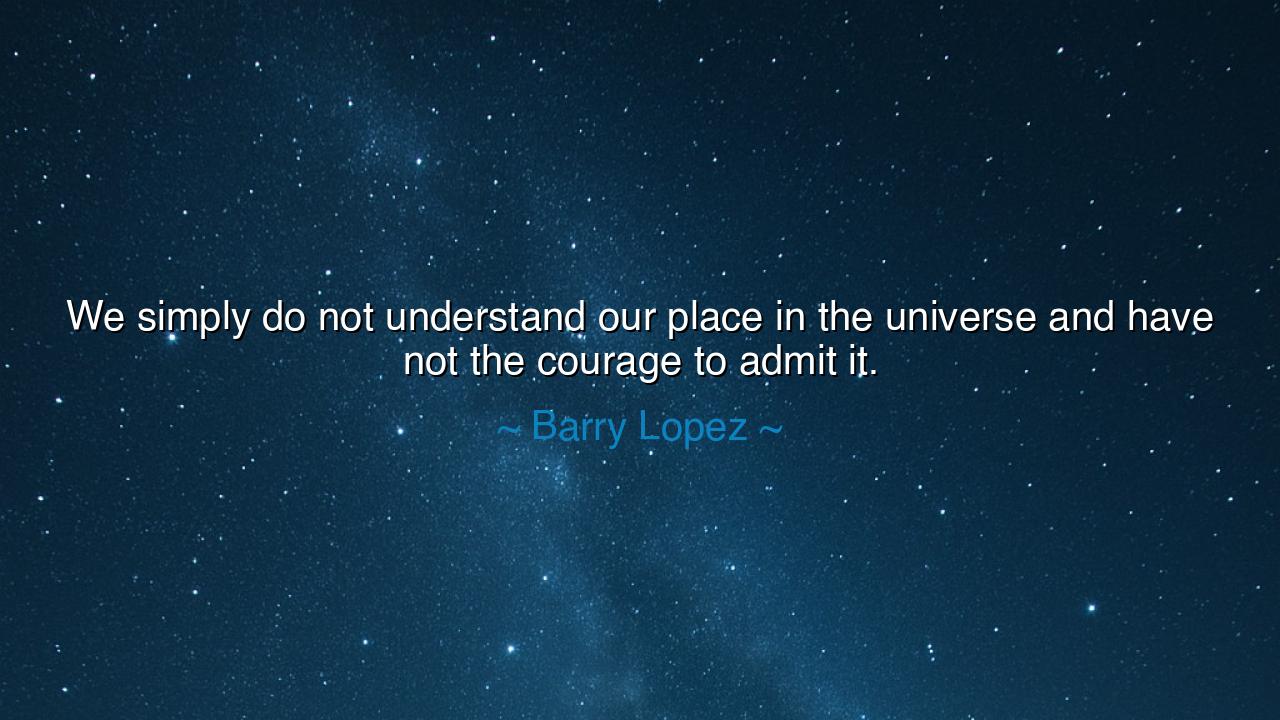
We simply do not understand our place in the universe and have
We simply do not understand our place in the universe and have not the courage to admit it.






“We simply do not understand our place in the universe and have not the courage to admit it.” — Thus spoke Barry Lopez, the great chronicler of wilderness and the human spirit, a man who looked into the heart of the natural world and found both awe and sorrow. His words echo like a lament across the ages — a cry of truth from one who saw that humankind, for all its intelligence and achievement, remains estranged from the cosmos that birthed it. In this profound statement, Lopez reveals the wound of modern man: that we are lost, not because we lack knowledge, but because we lack humility; not because we have no map, but because we refuse to admit that we are still learning to read it.
The origin of this thought comes from Lopez’s lifelong journey through nature — from the icy stillness of the Arctic to the deep forests of the American West. He spent his life listening to the earth, observing the patterns of animals, the silence of glaciers, the sacred rhythm of creation. And what he discovered was both astonishing and tragic: mankind, though surrounded by mystery and beauty, behaves as though it stands above the natural order, rather than within it. In our arrogance, we believe we have mastered the universe — charted its stars, tamed its beasts, and bent its resources to our will. Yet, as Lopez saw, we remain spiritually adrift. We have not the courage to look upon the vastness and admit our smallness, to confess that for all our cleverness, we do not truly know where we belong.
To understand our place in the universe is to accept that we are part of something immeasurably greater than ourselves — a living, breathing web of existence that extends beyond the limits of comprehension. But instead of reverence, humanity often responds with fear. We build systems of control to hide our vulnerability: cities that drown out the stars, technologies that isolate us from the land, ideologies that crown us as the center of creation. We call this progress, yet it is a kind of blindness. The courage Lopez speaks of is not the courage to conquer, but the courage to surrender — to look into the infinite night sky and feel wonder instead of superiority, to accept mystery as the foundation of truth.
This blindness is not new. Even the ancients wrestled with it. Consider Copernicus, who revealed that the Earth was not the center of the universe, but one small sphere orbiting a distant sun. His discovery shattered the illusion of human centrality — and yet, it was not his science that caused fear, but his humility. To accept that the universe does not revolve around us required immense courage. Those who lacked it clung to denial, preferring the comfort of illusion to the vertigo of truth. The same cowardice still lingers in the modern soul. We send ships into space and probes to other worlds, yet fail to see the sanctity of the soil beneath our feet. We claim to know the heavens, but we have forgotten how to kneel before them.
Lopez’s warning is therefore both spiritual and moral. When we forget our place in the universe, we lose not only perspective, but compassion. Believing ourselves separate, we exploit rather than steward, consume rather than cherish. We destroy the forests and the seas because we no longer see them as kin. To admit our ignorance, to confess that we are still students of the earth, would require humility — and humility demands courage, for it strips us of pride. Yet only through that humility can we rediscover balance. For the truth Lopez points toward is not meant to shame us, but to awaken us: to remind us that wisdom begins with reverence, and reverence begins with admitting how little we know.
We see this courage in rare souls throughout history — men and women who dared to look into the unknown without flinching. Think of Charles Darwin, who trembled at the implications of his own discoveries, yet published them anyway, knowing they would challenge the foundation of human arrogance. Or Rachel Carson, who faced ridicule for warning that humanity’s domination of nature was leading to ruin. These were people who understood Lopez’s call — that true strength lies not in mastery, but in understanding our interdependence with all things. Their courage was not born of certainty, but of humility: they dared to say, “We are part of something greater — and we must act accordingly.”
So, my listener of the ages, take this teaching into your own heart: have the courage to admit that you do not yet understand your place in the universe. Do not fear your smallness; cherish it, for it connects you to all creation. Look upon the night sky not with arrogance, but with awe. Listen to the wind, the sea, the silence — they are older and wiser than we. Seek not to conquer life, but to comprehend it. Ask questions that humble you, not ones that flatter your pride.
For in this humility lies the path to peace. When man accepts his place — not as master, but as participant — the world will once again become sacred. And perhaps then, as Lopez envisioned, we will no longer be strangers wandering through the cosmos, but children who have finally learned to listen to their mother — the earth — and through her, to the universe itself.






AAdministratorAdministrator
Welcome, honored guests. Please leave a comment, we will respond soon